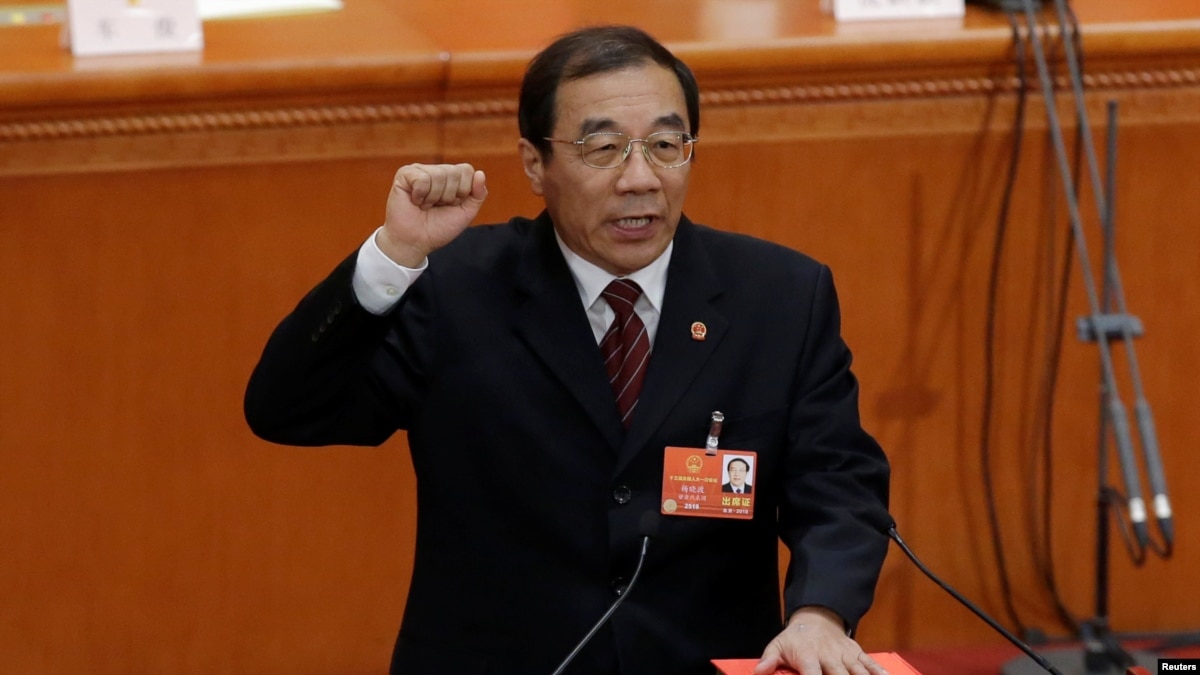
China’s largely rubber-stamp legislature has appointed the former head of its defunct Supervision Ministry as chair of a newly created and powerful anti-graft body that will oversee more than 100 million state employees.
Analysts say the choice of Yang Xiaodu, a low-profile official, is a logical move that helps serve Chinese President Xi Jinping’s political agenda to keep a tab on opponents and tighten social controls.
Yang, 64, was elected director of the National Supervision Commission, a massive anti-corruption agency that will make an already ongoing drive to snuff out graft even more expansive.
Graft-Buster
Prior to that Yang served as a deputy chief of the Communist Party’s Central Commission for Discipline Inspection since 2014. He also worked with Xi Jinping in Shanghai when Xi was the city’s party boss in 2007.
The National Supervision Commission expands the powers of the Discipline Inspection Commission and will be more powerful than the courts. But Yang’s appointment suggests the party’s absolute authority transcends the super anti-graft watchdog as he is expected to take orders from Zhao Leji, his more senior former boss.
Wang Kun-yi, an adjunct professor at Tamkang University in Taipei, referred to Yang as a collaborator of Xi’s anti-corruption campaign, "That’s why he was offered the top job.”
Wider Net
The anti-graft campaign, which began when Xi rose to power five years ago, has seen more than a million party members investigated, but now the new watchdog body will oversee an even wider swath of the country’s bureaucracy, including civil servants and employees of state-owned enterprises, regardless of whether they are party members or not.
Xi’s anti-corruption drive is aimed at uprooting graft, but it is also an effort to ensure the Communist Party's legitimacy and boosting the Chinese leader's popularity, something that it is more key now that he has a mandate to stay in office as long as he likes.
More importantly, analysts note, is the drive's political agenda to squash opponents and rivals for Xi.
“There will always be resistance and opposition to Xi’s political attempt to stay on. He’s got to have a unit to either keep a watchful eye or tighten controls. This is what the commission is really for,” Wang added.
Drawing lessons from the Four Cleanup Movements, a political movement late Mao Zedong launched in 1963 to remove “reactionary” forces within the party, the professor said he won’t be surprised to see the commission further extend its powers into the private sector, keeping a tab on mega businesses like Tencent or Alibaba as Xi’s tool to tighten social controls.
Plights for dissidents
“This will put China’s rights defenders and dissidents in an even more difficult situation because the earlier use of shuanggui (extrajudicial detention by investigators) is now replaced and institutionalized with a legal detention system,” said Teng Biao, a rights lawyer and a visiting fellow at New York University.
“In the past few years, Xi has shown no mercy in suppressing the private sector as he consolidates his grip on power,” the lawyer added.
A proposed Supervision Law, which is expected to be smoothly passed during the closing of China's legislature Tuesday, empowers graft investigators to enforce a period of three-month detention, which can be extended once, stripping graft suspects of legal protections encoded in China’s civil laws.
Many may easily fall victim to the arbitrary system that Jerome Cohen, a Chinese legal scholar at New York University, has described as “the [Spanish] Inquisition with Chinese characteristics.”
"Political leaders, bureaucrats, business figures and their employees, prosecutors, judges, legislators, professors and especially lawyers have good reason to fear they may be the next victims of a plainly arbitrary system," he told the Financial Times earlier.
Ren Jianming, director of the anti-corruption and governance research center at Tsinghua University in Beijing, however, gave credit to the national supervision reform, saying that it is a more efficient system.
He said given China’s one-party rule, reform progress will be incremental and subject to political influence.
“How much autonomy the NSC enjoys will depend on the party’s internal disciplinary system. Overall, we’re positive about the progress of the national supervision system’s reforms. But the fact that it shares offices, personnel and responsibilities with the Central Commission for Discipline Inspection does trigger concerns,” Ren said.
Read More Low-Profile Official to Head China's New Powerful Anti-Graft Agency : http://ift.tt/2pqmjS9
No comments:
Post a Comment